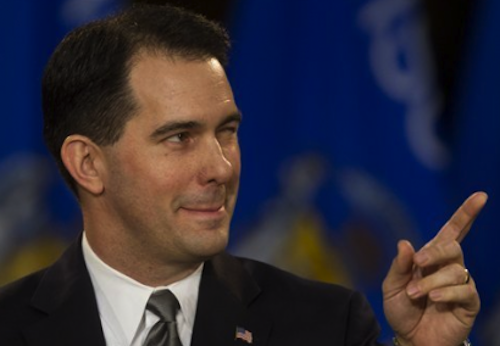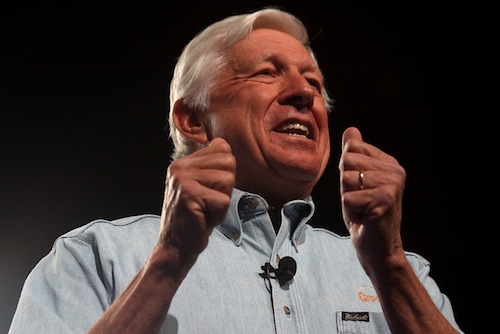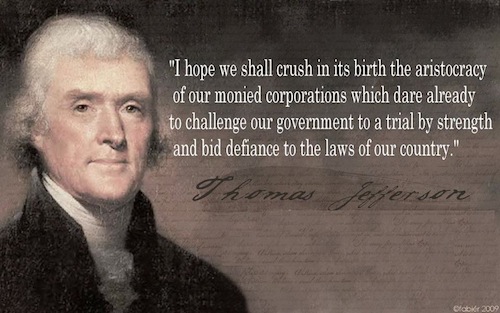This week, casino magnate Sheldon Anderson gave $10 million to the pro-Romney Super PAC Restore Our Future. We could talk for a long time about how weird and creepy the name “Restore Our Future” is, but that’s time we could better spend returning our anticipation of the years to come to conformity with our previous expectations. That’s what Adelson is doing. So far, he’s given $35 million to Republican Super PACs this election, and he says he’s prepared to spend as much as $100 million. Twenty million already went to Newt Gingrich, who failed in his bid to become the nation’s first homunculus president. Now Adelson must settle for Romney, who is like the body without the homunculus inside.
Tag Archives: super pac
In torrent of money, Scott Walker floats
The recall votes are in, and Scott Walker has easily remained governor of Wisconsin. Walker won by seven points over Milwaukee mayor Tom Barrett, who is the same person he defeated in the election of 2010. Let it never be said that the Democratic Party is a political slug who believes its moral superiority entitles it to win elections simply by not being the other guy. Wait, I did that wrong—let it always be said that thing about the slug. There is a silver lining in the Wisconsin Democrats’ plan to do the same thing and get different results, though. Two elections between the same two guys two years apart give us a rare opportunity to isolate variables, and there happen to be two things different about Walker vs. Barrett 2010 and Walker vs. Barrett 2012: The Rewalkering. One, the Supreme Court declared limits on corporate political spending unconstitutional in Citizens United v. FEC. Two, the first Walker/Barrett tilt cost $18.9 million, whereas yesterday’s recall cost $63.5 million.
Thursday corporatocracy watch: orange
When I checked the corporatocracy meter this morning, it was damn near red. It turns out that the Rick Santorum victories in Minnesota, Colorado and Missouri that came out of nowhere Tuesday night actually came from Foster Friess, a Tea Party supporter and mutual fund investor. Props to Mose for the link. When the Santorum campaign could not afford to purchase advertising, Friess’s donation to the Red, White and Blue Super PAC paid for a monster radio and television blitz in Minnesota. On Monday, meanwhile, President Obama announced that he would begin accepting the aid of super PACs, apparently reversing his position on entities he called a threat to our democracy. For a while there, it looked like the whole corporatocracy meter/valve/pump assembly was going to blow, but then the House banned insider trading by members of Congress. So we’re back to just running at maximum pressure.
“We don’t know what we don’t know”
The foregoing quote comes from Ellen S. Miller, executive director of the Sunlight Foundation, speaking to the New York Times about Super PAC donors. Tuesday did not just give us the primary that sealed the Republican nomination; it was also the day that various super PACs disclosed their funding, sort of. America’s bold experiment in calling money speech has yielded roughly eleventy gajillion dollars for both Mitt Romney and Barack Obama, although Romney seems to have netted slightly more. A lot of his donors are whom you’d expect: a coal company, a lobbyist for Altria, Haley Barbour’s nephew. Others are a little trickier, including a quarter million dollars from a corporation “with a post office box for a headquarters and no known employees.” Thomas Jefferson must be rolling over in his slave grave.
Elizabeth Drew on how an election feels fair
For a publication staffed entirely by nerds, the New York Review of Books sure is fired up about democracy. Their coverage of Occupy Wall Street is far better than that of any traditional news outlet—by comparison, the Times appears to have closed its office in New York—and their vituperation of Super PACs is only slightly less comprehensive. This weekend, Elizabeth Drew published this consideration of whether the 2012 election can possibly be fair. “Will the presidential election reflect the will of the people?” she asks, presumably rhetorically. She follows with a more important question: “Will it be seen as doing so—and if not, what happens?”





